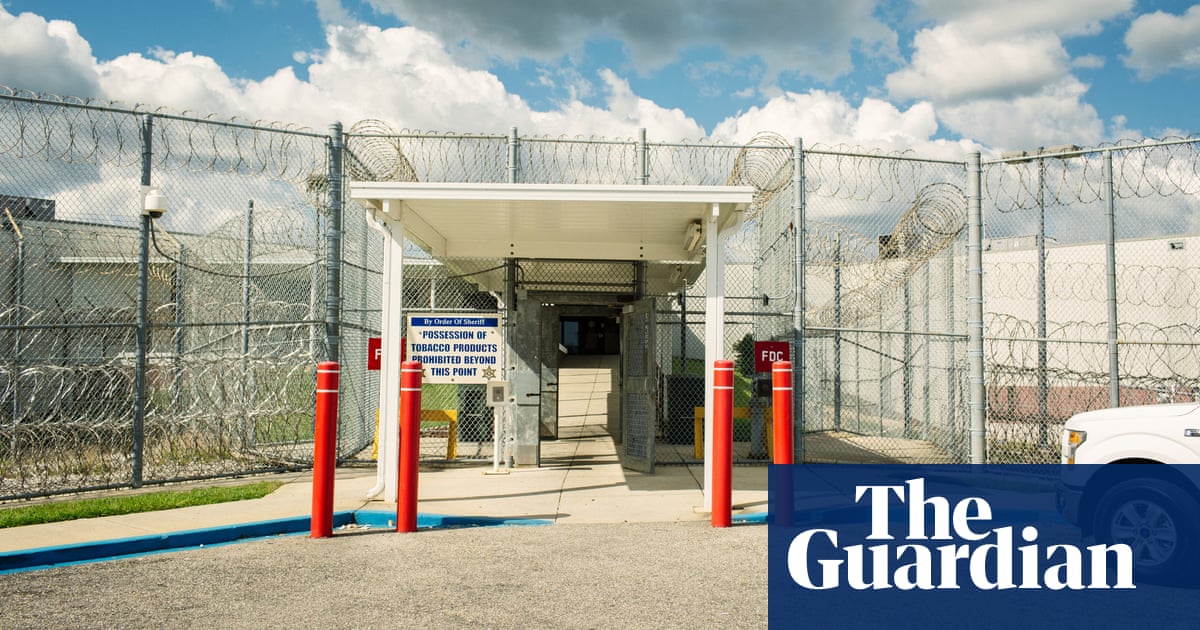It was a model on which the Trump administration based its criminal justice reform efforts. But it isnt working

Last November, as he rallied support for federal prison reform, Donald Trump visited Gulfport, Mississippi, touting the legislation and what Mississippi had accomplished.
Trump talked about the fantastic job that the Mississippi corrections commissioner, Pelicia Hall, was doing of turning the states prisons into places that train inmates for jobs.
The following month, Trump signed the First Step Act, which aims to reduce the federal prison population and better prepare offenders for life outside bars.
Yet the implementation of Mississippis reforms has been marked by broken promises and a lack of funding, according to interviews, data and documents reviewed by the Mississippi Center for Investigative Reporting and ProPublica.
The Mississippi law promised to send offenders to drug courts for treatment rather than to prison; provide ID cards to all offenders leaving prison to help them secure housing and jobs; offer training for offenders eligible for parole; and keep offenders guilty of technical probation violations from returning to prison.
But in each case, those efforts have faltered.
When the state governor, Phil Bryant, a Republican, signed house bill 585 into law in 2014, the measure drew widespread praise from conservatives and liberals alike because it promised to reduce the prison population, save millions and reinvest some of the money into programs for offenders.
Instead, all of those savings have gone back into the states coffers, helping to pay for huge corporate tax cuts at a time the state was struggling to meet revenue estimates.
Over five years, the Mississippi Department of Corrections spent $185m less in total than it would have had its budget remained at the level it was in 2014. The departments $347m budget for the coming fiscal year is $30m less than it was in 2014.
Meanwhile, the number of prisoners is creeping back up, and the lack of funding and staff is contributing to worsening conditions. Over the rest of this year, the Mississippi Center for Investigative Reporting and ProPublica will explore those conditions.
In an interview, the senior US district Judge Keith Starrett, of Hattiesburg, called house bill 585 a good law, but up until now, its never been fully implemented. Had it been fully implemented, it would have reduced recidivism. How much, well unfortunately never know.
Before the Mississippi legislature met in 2019, Hall told lawmakers that the reforms of house bill 585 were for naught if we dont reinvest the savings.
Experts say Mississippi provides a cautionary tale for the nation as it implements the First Step Act.
Emptying prisons of offenders without treating their addiction, without mental health treatment and without job training is really irresponsible, said Pat Nolan, the director of the American Conservative Union Foundations Center for Criminal Justice Reform, which campaigned for passage of the state and federal legislation.
Its unconscionable.
Between 1993 and 2013, Mississippis prison population more than quadrupled, thanks largely to mandatory minimum sentences, with the population peaking in the past decade at more than 23,000. The state had a higher per capita rate of incarceration than countries such as China or Russia.
By the time the bill became law in July 2014, the Mississippi Parole Board was paroling more offenders and had already reduced the prison population by about 2,000 inmates. Within six months, it fell even more, to below 19,000.
The Pew Charitable Trusts, which provided assistance to officials on the reform, predicted that by 2024 Mississippi would save $266m by reducing its prison population.
Supporters of the First Step Act point to such numbers as evidence of the federal laws potential. Weve based it on a lot of whats been done in a lot of the states like Mississippi, said the White House adviser Jared Kushner, who is Trumps son-in-law, at the Gulfport event.
Other numbers, however, tell a different story.
The prison population has begun to tick back up, from 18,964 in January 2018 to 19,697 last week, largely due to probation and parole revocations putting offenders back behind bars. If current trends continue, Mississippi will have more inmates in 2020 than it did before the reform became law.
The good news is its not as high as it was in 2014, the parole board chairman Steve Pickett said. But to quote President Reagan, Are we better off than we were four years ago? Do we have more parole and probation officers? Do we have more prison guards?

The answer, data shows, is no.
In 2014, the corrections department had 1,591 correctional officers, according to the state personnel board. Now there are 772, fewer than half as many.
In 2014, the department had 23 vocational education instructors. Now there are 15.
In 2014, there were three vocational counselors. Now there are two.
In 2014, there were 319 probation officers, according to the state personnel board. Now there are 257.
Moreover, the investments in prisoner rehabilitation and training havent happened either.
Hal Kittrell, of Columbia, the task force chairman and a past president of the Mississippi Prosecutors Association, said house bill 585 was designed to have a savings in cost, but it also anticipated reinvestment back into the program.
Texas saw $443m in savings from prison reform between 2008 and 2009 and reinvested more than half of that into expanding drug treatment and similar programs for offenders, according to the Council of State Governments.
The house corrections committee chairman, Bill Kinkade, said Mississippis economy is now growing, and that should enable lawmakers to spend more on reentry programs.
But the state has favored other priorities in recent years.
In 2015, lawmakers approved spending $9m on vouchers for special education students to attend private schools. A year later, the legislature began phasing out the corporate franchise tax, which was bringing in $260m a year. At the same time, it cut $145m in income taxes.
Hall, the corrections commissioner, called the decrease in personnel alarming, especially for correctional officers, saying they cant afford to live on the entry-level salary of $24,900.
Neighboring states are offering much more, she said. Alabama, which already pays thousands more than Mississippi, is considering raising its starting pay even more.
One bright spot, Pickett said, is the corrections department has increased funding for transitional beds, akin to halfway houses. The number of beds had remained mostly unchanged until this past year when they went from 120 to 314.
Am I satisfied with the progress? Kinkade asked. No, but were making strides and progress.
Among its primary aims, house bill 585 promised to redirect more offenders whose behavior was driven by drug and alcohol dependence away from prison and to drug courts, which connect them with job and life-skills training as well as drug, alcohol and mental health treatment.
A memo written by the not-for-profit Pew talked of a reinvestment of nearly $11m in savings into drug courts.
Instead, Mississippi lawmakers cut the annual budget for drug courts in half from nearly $8m in 2013. It has since inched up somewhat, to $6.5m this year.
Inside Mississippis prisons, three-fourths of the more than 19,000 inmates suffer from alcohol or drug woes.
Despite that, the corrections department has only 20 drug and alcohol counselors and one licensed psychologist, according to the state personnel board. Arkansas, which has a similar prison population, has eight psychologists and 33 administrators of its substance abuse programs.
Steps so far to provide community mental health have been small. Over the past three years, the corrections department has received $1.4m in federal grants for drug treatment and mental health treatment of offenders who returned to seven counties.
Good news came this spring when lawmakers passed, and the governor signed into law, a bill transforming the drug courts into intervention courts, which can also tackle mental health matters and issues affecting military veterans.
The state public defender, Andr de Gruy, said evidence shows drug courts can reduce recidivism if operated properly. Because Mississippi is one of the worst states in the nation in providing help for addiction and mental health issues, he said, a real reinvestment would be more money to pay for treatment through community mental health programs.
Mississippi also lacks programs to help offenders transition from prison to their communities, according to the task force that spearheaded the legislation.
Offenders entering Louisiana prisons are interviewed and given tests to assess their needs. Corrections officials then create plans to reduce the offenders risk of returning to prison and enter them in programs, including job training and money management.
By contrast, in Mississippi, nearly every inmate comes home at some point, unsupervised and unmanaged, said Kinkade, the house corrections committee chairman.
Mississippis corrections department had a risk-assessment test, but it lacked proof that it worked, Hall said.
A new tool is being used on every offender who enters prison, she said.
It will be used again as they leave, she said.

House bill 585 requires Mississippis corrections department to ensure each of the more than 8,000 offenders leaving prison annually has a drivers license or state ID card, but lawmakers provided no extra funding for these cards. Fewer than 100 offenders are receiving them a month, according to the department.
You cant get a job without an ID, Starrett said. If you somehow get a job, you cant cash a check without an ID. You cant even get some prescriptions from the drugstore without an ID.
The problem is many offenders lack birth certificates or Social Security cards, and the Department of Public Safety requires both for an ID card, she said. It can take months or even longer for replacements to arrive, she said.
Louisiana corrections officials try to get at least two forms of identification for offenders, as well as replacement birth certificates and Social Security cards if needed.
Since taking over the corrections department in 2017, Hall said she has made providing IDs a priority. The Mississippi Department of Public Safety now comes to the prisons as often as once a week, she said.
Louisiana also enables judges to preside over a reentry program, where nonviolent offenders who face up to 10 years in prison may qualify to join a job-training program that can cut their time behind bars down to two years.
Those who finish the program have a recidivism rate of 9.4%, compared to more than 30% for the average inmate in Louisiana.
Mississippi offers fewer educational or vocational programs, but offenders taking part in them have a lower recidivism rate than the state as a whole, 16% to 19% compared with 33%, Hall said.
Outside prison, Mississippi operates no halfway houses, and probation officers say they are overwhelmed.
One former Mississippi probation officer said her caseload earlier this year included as many as 340 offenders. She assisted many in getting into rehab, some into jobs and some in getting their drivers licenses back.
We were desperately understaffed, said the officer, who asked not to be named for fear it could hurt her new job in another state. It was very stressful.
Hall acknowledges a lack of staffing. To handle such woes, probation officers now focus on high-risk offenders. But with caseloads of 200 to 300 people, the task is difficult, if not impossible, she said.
Kittrell, a district attorney for five counties in south central Mississippi, said said unless the state starts investing in reentry programs, offenders are destined to return to prison.
Here we are, releasing them into the same neighborhood, with no skill sets at all, and expecting a different outcome, he said. Thats the definition of insanity.
Another priority of the law was to reduce recidivism.
Hoping to reduce probation revocations, house bill 585 requires judges to send offenders guilty of two or fewer technical violations to a technical violations center.
Many judges balked.
They feel like some discretion has been taken away from them, the circuit Judge Prentiss Harrell, of Hattiesburg, said.
Another judge ruled house bill 585 unconstitutional, saying it violated the separation of powers, a decision the Mississippi supreme court later overturned.
Despite its flaws, house bill 585 has meant a new beginning for some.
Jody Owens II, the Southern Poverty Law Centers managing attorney for Mississippi, said the law has paved the way for trial judges to help give new lives to nonviolent offenders. The parole board is releasing about two offenders a month under this provision, the board says.
Inmate Jerry Johnson hopes to join them. In 1993, he received 60 years without parole in Coahoma county circuit court for making two $20 crack cocaine sales under Mississippis three strikes rule. In March, a judge there authorized Johnsons eligibility for parole.
If the parole board agrees, Johnson, 60, would walk free after 26 years in prison. Owens said Johnson wants to help his ill sister and assist youth in the community.
This would save Mississippi approximately $620,000, the expected cost of imprisoning him for the rest of his term, Owens said. This is so significant. It is giving people freedom.
ProPublica research reporter Claire Perlman contributed to this report.
Jerry Mitchell is an investigative reporter for the Mississippi Center for Investigative Reporting, a not-for-profit news organization that seeks to hold public officials accountable and empower citizens in their communities. Email him at Jerry.Mitchell.MCIR@gmail.com and follow him on Facebook at @JerryMitchellReporter and on Twitter at @jmitchellnews.
Read more: https://www.theguardian.com/us-news/2019/may/09/mississippi-prison-reform-failed-first-step-act


Recent Comments